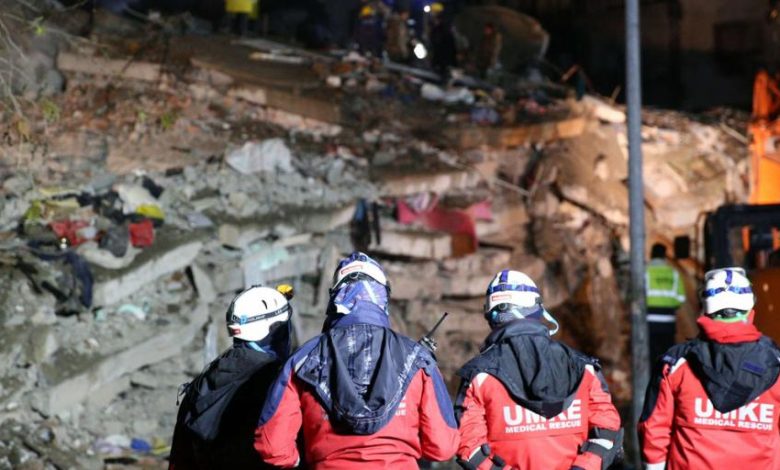International aid must start flowing to Turkey and Syria to save survivors from the rubble – Details

International aid is due to arrive in Turkey and northern Syria on Tuesday as the race drags on with time and cold across northern Syria to rescue survivors from three powerful tremors that hit the region on Monday and left thousands dead.
The most recent official tally, likely to rise after nearly 20 hours of the first 7.8 magnitude tremors also felt in Lebanon, Cyprus and northern Iraq, showed more than 4,890 dead, 3,381 in Turkey, according to the General Authority for Disaster Management (AFAD), and more than 1,440 in Syria.
“Rescue teams struggled in the cold, heavy rain or snow, sometimes using hands, to rescue people trapped in the rubble.” A seven-year-old girl was rescued in Hatay in southern Turkey near the Syrian border more than 20 hours after the earthquake.
Bad weather in Turkey’s Anatolia region is hampering rescue teams’ work and adding to the suffering of cold survivors under tents and around fire stoves erected in the affected areas.
First International Aid Conference
International aid to Turkey is due to begin arriving on Tuesday, with first responders from France and Qatar in particular. U.S. President Joe Biden has promised Turkish President Recep Tayyip Erdogan “whatever help we need.”
French aid teams are planning to go particularly to Kahramanmaraş, the epicenter of the first earthquake, a rugged area that was heavily damaged and blanketed by snow.
Two US units, each with 79 medics, are preparing to leave for Turkey on Monday, the White House said.
China on Tuesday announced $5.9 million in aid, including specialized urban aid workers, medical teams and emergency equipment, according to state-run media in Beijing.
The Turkish president said 45 countries had offered his help.
In Syria, meanwhile, it responded to calls from Damascus, its ally Russia, which promised to send relief teams “in the coming hours,” while the army confirmed that more than 300 Russian military personnel were deployed in the quake-hit region to help with rescue operations.
The UN also took action but stressed that the aid should go “to all Syrians on all territory” in Syria, some of which is outside government control.
In these areas, held by opposition factions and on the border with Turkey in northwest Syria, at least 700 people have been killed.
The death toll continued to rise on both sides of the border. The extent of the damage is likely to increase as the search progresses.
In Turkey alone, some 5,000 buildings have collapsed, while those injured face the threat of hypothermia from frostbite.
Accommodation center
The World Health Organization said it expects the worst and feared the “toll will be eight times higher than the first figures” published.
At least 185 aftershocks were recorded on Monday, the first two of which measured 7.8 magnitude overnight and the second 7.5 magnitude, with their epicenter located in northeastern Turkey.
Overnight and before dawn on Tuesday aftershocks of up to 5.5 degrees Celsius struck at 09:13 local time (03:13 GMT), nine kilometers southeast of Gölbaşı in southern Turkey.
Authorities have turned sports halls, schools and mosques into shelters for survivors. “However, fearing new tremors, many residents preferred to spend the night outdoors, as in Şanlıurfa in southeastern Turkey.”
“Who doesn’t fear?” said Mustafa Kweongo, 55, who sat in the family car with his wife and five children. Everyone’s afraid.”
It was the most severe earthquake to hit Turkey since 17 August 1999, killing 17,000 people, including 1,000 in Istanbul.












